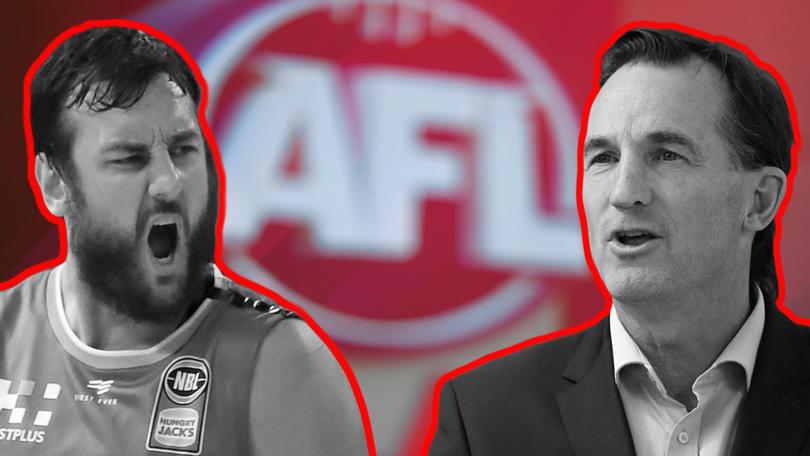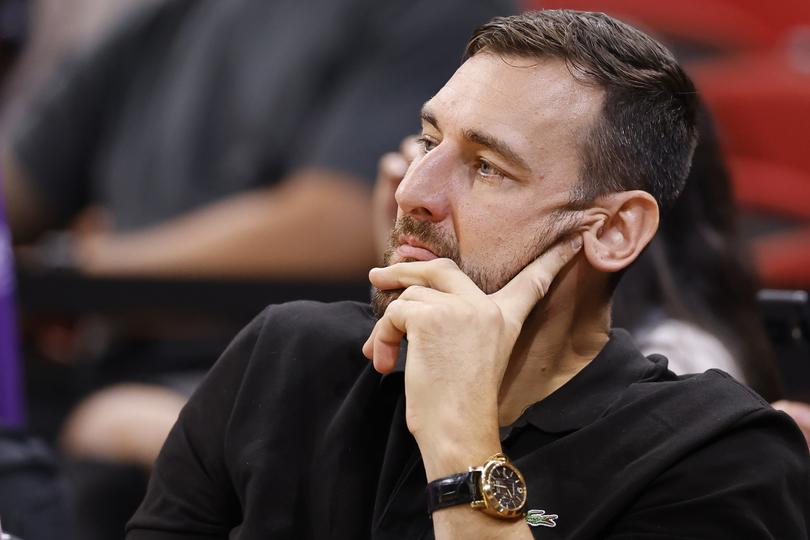Basketball icon Andrew Bogut slams AFL over drugs and says anyone with ‘half a brain’ can spot the cover-up
Outspoken basketball icon Andrew Bogut said ‘anyone with half a brain’ could see why the AFL was allowing its stars to fake injuries to avoid drug officials on game day.

Basketball icon Andrew Bogut has become the latest high-profile sporting star to slam the AFL for covering up drug abuse by players.
The outspoken Bogut said “anyone with half a brain” could see why the AFL was allowing its stars to fake injuries to avoid drug officials on game day.
“The AFL continues to tell people about how they should live their lives but they should clean up their own league before they start preaching on social issues,” the former NBA player said.
Sign up to The Nightly's newsletters.
Get the first look at the digital newspaper, curated daily stories and breaking headlines delivered to your inbox.
By continuing you agree to our Terms and Privacy Policy.“It’s quite obvious what’s happened — the AFL knew they had a problem with guys using drugs, so let’s just have them pull out with a sore hammy and dodge the testing that way.
“Anyone with half a brain can see why they’ve done it. They’ve obviously tried to move the chess pieces around to navigate a (WADA) policy they have agreed to abide by — because the carrot is federal government funding.
“Everyone knows what goes on in Melbourne. I’ve been to numerous nightclubs where the AFL guys are drinking a bottle of water and jumping around like crazy. I’ve been offered it (drugs) by AFL players and the fact that it has been kept under wraps for so long just shows how far the AFL tentacles can reach.”
It comes after The Nightly revealed the AFL was refusing to publicly release its corporate drugs policy.
The Nightly posed questions to the AFL about its corporate workplace drugs policy, including whether it followed other industries, such as the resources sector, by having similar standards in place for desk-bound workers as it does for employees in the field.
It is understood contradictions between how players and bureaucrats are treated under the drugs policy have been a bone of contention for many years.
An AFL spokesman said it had a policy, but refused to share it publicly.
It’s another serious blow to the credibility of the governing body, which has been reeling from public backlash since independent MP Andrew Wilkie used parliamentary privilege to air shocking allegations of widespread “off-the-books drug testing” by clubs.

Under the secret testing regime, players who record positive results are encouraged by clubs to fake injuries so they can avoid game-day officials and face sanctions.
On Wednesday, AFL chief executive Andrew Dillon said he hadn’t read any of Mr Wilkie’s documents, from Melbourne’s former club doctor Zeeshan Arain and ex-president Glen Bartlett. “I heard what Andrew had to say,” Mr Dillon said. “I’m not sure they (the documents) will ... add a great deal.”
On Tuesday, reformed addict and champion jockey Jamie Evans joined the chorus of critics by dubbing the AFL drugs policy “f...ing useless” and so soft it could endanger players’ lives by enabling addiction.
“The penalty at the moment is nothing and it gives them no incentive not to do it again,” Evan said.
“They (the AFL) think they’re protecting them, but they’re doing the opposite. They’re putting them in such a bad position because so many people don’t understand addiction.I bet the person who made up these rules has no idea about addiction.”

Evans said he warned AFL clubs as far back as 2015 that their policy was too soft.
The Australian also reported on Tuesday that the founding president of the World Anti-Doping Agency, Dick Pound, was so furious with the AFL’s trickery that he compared its off-the-books testing loophole with the notorious doping tactics of East Germany and Russia in the 1970s and 80s.
“Drug testing is not meant to be unofficial,” he said.
“If they test and find that an athlete tests positive, there’s an obligation to report on that and for the consequences to follow.
“Clearly that is not in the spirit or the rule of the (WADA) code and if the AFL was really interested in making sure that they were code compliant, they would get an opinion from WADA whether, ‘If we do this, is this bad or good?’”
The AFL has publicly stood behind its drug testing policy despite the wide-ranging criticism, saying: “The policy seeks to reduce substance use and drug-related harms for AFL players and aims to inform and rehabilitate players through education and intervention.”
AFL Players Association president and champion Geelong footballer Patrick Dangerfield also defended the policy. “I think there are a few dinosaurs living under a rock out there, with regard to the realities of modern society, whether or not you agree with it,” he said. “We get it doesn’t make it OK, but we also have to live in the land that is reality.”
Writing for The Nightly, former Australian netball captain Caitlin Bassett said the fake injuries scam being supported by the AFL was “offensive to professional athletes across Australia”.

